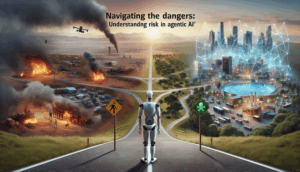What Happens When AI Grows Up?
Let’s be honest: most of today’s “smart” technology is about as independent as a microwave with a fancy timer. Traditional AI follows scripts and algorithms, ticking boxes like the world’s most diligent intern. But what happens when AI breaks free of the to-do list and starts making decisions on its own, right beside you? What will Agentic AI look like in this scenario? Welcome to the world of Agentic AI—not just a tool, but a digital colleague ready to change the fabric of work and life as we know it.
From Task Rabbits to Thinking Partners
Agentic AI isn’t here to run your errands—it’s here to help you rethink what errands even are. By leveraging advanced machine learning, these agents can adapt in real time, taking into account your preferences, environment, and goals. Imagine checking into a hotel and your AI agent already knows you love corner rooms, hate feather pillows, and want to hit the gym at 6 a.m.—and then makes it happen.
Takeaway: We’re moving from tools you command, to partners that collaborate. As Jordan M. Hollander has observed, AI in hospitality is less about automation and more about anticipation (see Hospitality Net: AI in Hotel Technology).
Why Every Business Needs an Agentic Strategy
If you’re an organization still treating AI as a buzzword, here’s a reality check: success now hinges on how well you integrate Agentic AI—not just for efficiency, but for survival. The path to value? Clear objectives. Robust implementation plans. Metrics that actually make sense. Just ask Gartner: companies that wing it risk expensive failures. The winners are aligning AI projects with business goals from the outset.
Meet Your New Personal AI Agents
Let’s fast-forward five years. Personal AI agents aren’t just “nice to have”—they’re the norm. In finance and hospitality, these digital assistants will know your spending habits, predict your next move, negotiate upgrades, and even steer you away from questionable purchases (or toward irresistible deals).
Hospitality platforms like Hive are already pioneering this future, using AI not as a replacement for staff but as a revenue-boosting teammate. It’s no longer about customer service—it’s about customer symbiosis.
Finance? The evolution is just as radical. Personal AI agents crunch data, forecast trends, and answer your banking questions at lightning speed. Yet, as Marketing Week points out, this hyper-personalization comes with new privacy and trust challenges. Responsible AI isn’t just a slogan; it’s a requirement.
Real-World Wins and Wake-Up Calls
By 2028, the Agentic AI transformation will be obvious.
- Marketing: AI-driven analytics (McKinsey: How AI is Transforming Marketing) can push campaign ROI up 30%—by ditching scattergun ads for laser-focused outreach.
- Finance: AI spots fraud before your CFO does. (PwC: AI in Financial Services) estimates up to $1 trillion in savings just from cutting losses.
- Hospitality: Custom service becomes scalable, thanks to agent-powered platforms that give every guest the VIP treatment. (Ask Brian Reeves, CEO of Roomangel, about hotels “layering” AI for unique needs.)
These aren’t hype stories—they’re blueprints for what’s coming.
Can AI Be Too Smart? (The Ethical Elephant in the Room)
But hold on: when AI can make its own decisions, who’s on the hook when it messes up? Cassie would say: “With great autonomy comes great accountability.”
Regulatory frameworks aren’t just paperwork—without them, Gartner warns, failure rates could top 40% by 2027. Privacy, transparency, and human oversight must be built into every project from day one.
And let’s talk jobs. Yes, Agentic AI can automate roles—but it can also create new ones. The real risk is stagnation: companies that don’t upskill will see their people (and profits) left behind. The lesson? Invest in learning; adapt faster than the algorithms.
The Tools, the Tricks, the Takeaways
How do you get started?
- Smart Agents: Today’s “digital assistants” can handle bookings, answer questions, and keep customers happy 24/7 (see Hospitality Net: AI in Hotel Technology).
- Flexible Frameworks: Don’t force AI into a box. OpenAI’s API lets you customize for your needs—no matter the size of your business (see FinTech Futures: Banking Business Models).
- Specialized Tools: Need inspiration? Fertility clinics use AI like Smart Compose to streamline patient care.
- Learning Resources: Sites like AgentModeAI teach you to build your first AI agent—no coding required (see AgentModeAI: How to Build Your First AI Agent Without Coding).
Pro tip: Stay curious. The companies that thrive are the ones who never stop learning.
Looking Five Years Forward
Agentic AI will only get smarter—reading nuance, understanding context, and responding like a true colleague. Healthcare will feel the difference, with smoother patient journeys and faster care (as ScienceDirect reports). Banking and customer service will see frictionless compliance and “co-worker” AI (thanks, DevDiscourse: Agentic Automation).
Ultimately, the question is: Are you preparing to work with AI, or against it? The organizations ready to lead are already weaving Agentic AI into the core of their culture.
Want to Learn More? Here’s Where to Start
- AgentModeAI: When Mammoths Vanished: What Prehistoric Job Loss Can Teach Us About AI
- AgentModeAI: How to Build Your First AI Agent Without Coding
- Hospitality Net: AI in Hotel Technology: A Paradigm Shift
- McKinsey: How AI is Transforming Marketing
- PwC: AI in Financial Services.
Final Thought:
Agentic AI isn’t a replacement for people—it’s the next chapter in our story. The only question is whether you’ll write that story yourself, or let someone else’s algorithm do it for you.



